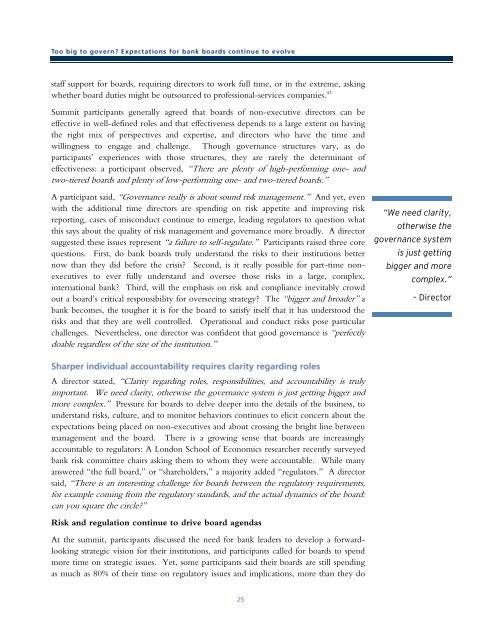Tapestry_EY_BGLN_Summit_View_The_future_of_global_banking-Dec14 (1)
Create successful ePaper yourself
Turn your PDF publications into a flip-book with our unique Google optimized e-Paper software.
staff support for boards, requiring directors to work full time, or in the extreme, asking<br />
whether board duties might be outsourced to pr<strong>of</strong>essional-services companies. 43<br />
<strong>Summit</strong> participants generally agreed that boards <strong>of</strong> non-executive directors can be<br />
effective in well-defined roles and that effectiveness depends to a large extent on having<br />
the right mix <strong>of</strong> perspectives and expertise, and directors who have the time and<br />
willingness to engage and challenge. Though governance structures vary, as do<br />
participants’ experiences with those structures, they are rarely the determinant <strong>of</strong><br />
effectiveness: a participant observed, “<strong>The</strong>re are plenty <strong>of</strong> high-performing one- and<br />
two-tiered boards and plenty <strong>of</strong> low-performing one- and two-tiered boards.”<br />
A participant said, “Governance really is about sound risk management.” And yet, even<br />
with the additional time directors are spending on risk appetite and improving risk<br />
reporting, cases <strong>of</strong> misconduct continue to emerge, leading regulators to question what<br />
this says about the quality <strong>of</strong> risk management and governance more broadly. A director<br />
suggested these issues represent “a failure to self-regulate.” Participants raised three core<br />
questions. First, do bank boards truly understand the risks to their institutions better<br />
now than they did before the crisis? Second, is it really possible for part-time nonexecutives<br />
to ever fully understand and oversee those risks in a large, complex,<br />
international bank? Third, will the emphasis on risk and compliance inevitably crowd<br />
out a board’s critical responsibility for overseeing strategy? <strong>The</strong> “bigger and broader” a<br />
bank becomes, the tougher it is for the board to satisfy itself that it has understood the<br />
risks and that they are well controlled. Operational and conduct risks pose particular<br />
challenges. Nevertheless, one director was confident that good governance is “perfectly<br />
doable regardless <strong>of</strong> the size <strong>of</strong> the institution.”<br />
“We need clarity,<br />
otherwise the<br />
governance system<br />
is just getting<br />
bigger and more<br />
complex.”<br />
– Director<br />
A director stated, “Clarity regarding roles, responsibilities, and accountability is truly<br />
important. We need clarity, otherwise the governance system is just getting bigger and<br />
more complex.” Pressure for boards to delve deeper into the details <strong>of</strong> the business, to<br />
understand risks, culture, and to monitor behaviors continues to elicit concern about the<br />
expectations being placed on non-executives and about crossing the bright line between<br />
management and the board. <strong>The</strong>re is a growing sense that boards are increasingly<br />
accountable to regulators: A London School <strong>of</strong> Economics researcher recently surveyed<br />
bank risk committee chairs asking them to whom they were accountable. While many<br />
answered “the full board,” or “shareholders,” a majority added “regulators.” A director<br />
said, “<strong>The</strong>re is an interesting challenge for boards between the regulatory requirements,<br />
for example coming from the regulatory standards, and the actual dynamics <strong>of</strong> the board:<br />
can you square the circle?”<br />
Risk and regulation continue to drive board agendas<br />
At the summit, participants discussed the need for bank leaders to develop a forwardlooking<br />
strategic vision for their institutions, and participants called for boards to spend<br />
more time on strategic issues. Yet, some participants said their boards are still spending<br />
as much as 80% <strong>of</strong> their time on regulatory issues and implications, more than they do


